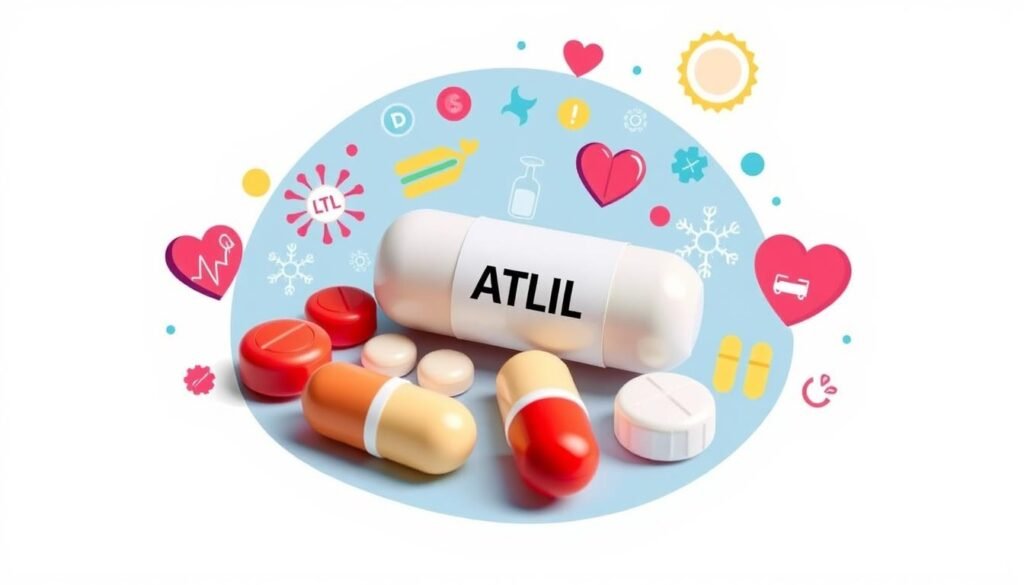About half of people with high cholesterol don’t meet their goals on statins. This fact highlights the need for other high cholesterol treatments beyond common statins, such as Lipitor and Crestor. While drugs like atorvastatin or rosuvastatin are standard for controlling cholesterol, some can’t take them or don’t get the results they want.
It’s crucial to know about different treatments available. This article looks at options besides statins for managing cholesterol levels. We’ll cover cholesterol absorption inhibitors, PCSK9 inhibitors, and bile acid sequestrants. Understanding these alternatives allows patients and healthcare providers to make better choices for cholesterol care.
Key Takeaways
- Nearly 50% of patients do not achieve cholesterol goals on statins.
- Understanding other medications for high cholesterol is important for effective treatment.
- Non-statin therapies include cholesterol absorption inhibitors and PCSK9 inhibitors.
- Alternative options are vital for those unable to tolerate statin therapy.
- Combining medications and lifestyle changes can enhance cholesterol management.
Understanding High Cholesterol and Its Risks
High cholesterol means you have too much cholesterol in your blood. This condition can lead to serious health problems. High cholesterol causes fatty deposits to build up in arteries. This buildup makes it hard for blood to flow properly, raising the risk of heart attacks and strokes.
Many things can make your cholesterol levels go up. Eating a lot of foods with saturated and trans fats is bad for cholesterol. Smoking lowers the good cholesterol (HDL) and raises the bad one (LDL), which is not good for your heart. Stress can also make your body produce more cholesterol. Drinking too much alcohol and not exercising can both negatively affect your cholesterol levels too.
It’s important to know your family’s health history. If high cholesterol runs in your family, you’re at higher risk. Cholesterol tests start at age nine for kids and teens. Men should get checked every five years until they turn 45, then more often. Women follow a similar pattern but start more frequent checks at age 55. These checks become even more critical if you already face a higher risk of heart disease.
Knowing how high cholesterol links to other health issues is crucial. Many adults in the U.S. deal with both high cholesterol and high blood pressure. Problems like chronic kidney disease can also make cholesterol issues worse. Taking steps early on, like getting regular cholesterol checks, makes a big difference in your health.
For more details on checking your cholesterol and the risks it brings, visit Mayo Clinic. To learn about treatment options and how you can manage your cholesterol, check out Easy Heart Boost.
| Risk Factor | Impact on Cholesterol |
|---|---|
| Diet high in saturated fats | Increases total cholesterol |
| Smoking | Reduces HDL; increases LDL |
| Lack of exercise | Decreases HDL production |
| Stress | Elevates cholesterol production |
| Excessive alcohol consumption | Raises total cholesterol |
Importance of Cholesterol Management
Keeping cholesterol in check is key for a healthy heart. It helps cut down the risk of heart disease. Mixing lifestyle changes with medicine makes a big difference. This approach greatly lowers the chance of heart attacks and strokes.
Lipid-regulating medications are vital for controlling high cholesterol, especially when diet and exercise aren’t enough. Statins are a popular choice. They reduce bad LDL cholesterol and triglycerides. Plus, they can bump up good HDL cholesterol a bit. Another option is cholesterol absorption inhibitors like Ezetimibe, which also help by reducing LDL and adjusting triglycerides.
It’s important to keep an eye on cholesterol levels regularly. This lets doctors make the best plan for each person. Some people might need extra help, like PCSK9 inhibitors, to get their cholesterol right. Working on cholesterol can lower death rates from heart disease.

- Regular lipid profile testing
- Incorporating lifestyle changes such as diet and exercise
- Utilizing lipid-regulating medications for those who need additional support
- Proactive dialogue with healthcare providers to tailor treatment
Putting focus on cholesterol management is a big step toward a healthy heart. It helps avoid serious health issues later on.
Statins: The Standard Treatment for High Cholesterol
Statins are key for controlling high cholesterol. They work by reducing bad cholesterol (LDL). These cholesterol-lowering medications block a specific liver enzyme. This process cuts down LDL and raises good cholesterol (HDL) a bit. Some of the common ones are Lipitor (atorvastatin), Crestor (rosuvastatin), and Zocor (simvastatin).
Studies show statins really help heart health. One big study with over 170,000 people proved statins cut down on heart attacks and strokes. The 2008 JUPITER Trial found a 54% lower heart attack risk and 48% lower stroke risk with statin use. This shows how vital it is to control LDL cholesterol for heart health.
Statins are great, but some folks get side effects. About 10% might feel muscle aches. Serious muscle damage is very rare. Some worry about memory loss or dementia, but it’s not common. They might raise your blood sugar a little. Still, the good they do for your heart usually outweighs these risks.

It’s crucial to stay on top of your health with statins. Check in with your doctor often. And lifestyle changes can boost your cholesterol fight. Healthcare pros can tailor treatment just for you. For deeper details on cholesterol treatments, click on this resource.
| Medication | Generic Name | % LDL Reduction | Common Side Effects |
|---|---|---|---|
| Lipitor | Atorvastatin | 30-50% | Muscle pain, increased blood sugar |
| Crestor | Rosuvastatin | 40-60% | Muscle pain, slight risk of diabetes |
| Zocor | Simvastatin | 25-40% | Muscle pain, liver enzyme elevations |
Other Medications for High Cholesterol
Statins are usually the first choice for treating high cholesterol. However, there are other options too. These are for people who can’t handle statins or need more help. Each type of medication works differently, fitting different needs.
Cholesterol Absorption Inhibitors
Ezetimibe is one such medicine, stopping the body from taking in cholesterol from food. It’s great for those who can’t use statins or need extra help. But, watch out for possible side effects like diarrhea and joint pain. Always talk to doctors about using it with other medicines.
PCSK9 Inhibitors
PCSK9 inhibitors are for those at high risk of heart disease but still have high cholesterol. They help the liver get rid of it. When used with statins, they can really lower bad cholesterol levels.
Bile Acid Sequestrants
If statins don’t work or aren’t an option, there’s another group of drugs. These drugs grab onto bile acids, which lowers the cholesterol in the body. This drops bad cholesterol levels. Yet, this choice can cause stomach issues for some.

For deeper insights into these treatments, check out cholesterol medications. Knowing about these options can help manage high cholesterol better.
Exploring Non-Statin Therapies
Many are looking at non-statin therapies as good ways to handle high cholesterol. This is especially true for those who can’t handle statins or need more LDL-C reduction. Options like fibrates, niacin, and omega-3 fatty acids are included. Each has its own role in managing cholesterol.
Fibrates and Their Role
Fibrates are mainly used to lower triglycerides. They also can reduce LDL-C a bit and raise HDL-C levels. They work by activating certain receptors that control how the body handles fat. Even though fibrates are helpful, some people might not tolerate them well. This makes it important to watch patients closely.
Niacin: The B Vitamin Alternative
Niacin, which is vitamin B3, helps by lowering triglycerides and raising HDL-C. It has proven to be beneficial. However, there are some concerns about how well people can handle it and its side effects. These issues may stop some people from using niacin.
Omega-3 Fatty Acids for Cholesterol Management
Omega-3 fatty acids are key for heart health. They’ve shown to help with lipid levels. These acids can lower triglyceride levels. For those with high triglycerides, omega-3s are often recommended. Including omega-3s through supplements or eating fatty fish is a good strategy for managing cholesterol.
| Non-Statin Therapy | Primary Benefits | Potential Concerns |
|---|---|---|
| Fibrates | Lower triglycerides, modest LDL-C reduction, increase HDL-C | Tolerability issues, potential interactions with statins |
| Niacin | Reduces triglycerides, increases HDL-C | Tolerability issues, side effects such as flushing |
| Omega-3 Fatty Acids | Reduces triglycerides, potential anti-inflammatory effects | Possible gastrointestinal side effects, cost of high-quality supplements |
These non-statin therapies are important options for managing cholesterol. They fit different needs and preferences of patients.
Combination Therapies: Maximizing Treatment Efficacy
Combination therapies are key in managing high cholesterol. They use two or more drugs to lower lipid levels together. This approach helps doctors improve how well treatments work. These methods are especially good for patients who don’t respond well to just one medication.
One effective method combines statins with Ezetimibe, which blocks cholesterol absorption. This duo can cut LDL-C by 15% to 18%. Ezetimibe is great because it’s safe and doesn’t cause many drug interactions. It makes statins work even better.
These therapies are in line with guidelines that want really low LDL-C levels for high-risk patients. But, not enough patients are hitting these goals. This shows we need better plans and more knowledge about these treatments.
Research says we should use these combo treatments more, especially for those at high risk of heart disease. The European Atherosclerosis Society Task Force suggests using them right away for these patients. This could change how we fight cardiovascular risk.
As more proof shows these methods work, doctors should use them more. Making treatment plans that match what each patient needs can greatly improve how we handle cholesterol. It could lead to less heart disease from clogged arteries.
Key Considerations When Choosing Medications
Choosing the right medication for cholesterol involves a few key considerations. It’s important to look at medical history, possible drug interactions, and side effects. Getting a treatment tailored to the patient boosts adherence and success.
For choosing medications, it matters what health issues exist, how well someone can handle treatments, and their cholesterol numbers. For instance, an LDL over 190 mg/dL usually means medication is needed. Diabetics, due to their higher heart disease risk, may need to start therapy earlier. Also, a risk score for heart disease over 5% in ten years and high triglycerides emphasize the need for treatments like statins.
Talking well with healthcare providers is key in making good cholesterol management plans. Sometimes, just changing lifestyle isn’t enough because of genetic issues like familial hypercholesterolemia. So, medication is needed even after making lifestyle changes.
The decision on treatment may bring up choices like statins, PCSK9 inhibitors, or other options. Each has its benefits and risks that need careful thought before starting.
Understanding these points helps patients navigate cholesterol management. This way, they can find a treatment plan personalized to their health needs.
| Condition | Medication Type | LDL Reduction | Common Side Effects |
|---|---|---|---|
| High LDL Cholesterol | Statins | 22% to 50% | Muscle aches, risk of diabetes, nausea |
| Familial Hypercholesterolemia | PCSK9 Inhibitors | 43% to 64% | Injection site reactions, muscle soreness |
| High Triglycerides | Fibrates | Significant | Nausea, stomach pain, gallstones |
| Overall Cholesterol Management | Niacin | Decreases LDL, increases HDL | Facial flushing, high blood sugar |
Conclusion
Managing high cholesterol isn’t just about statins. Though they’re key players, it’s important to consider other treatments too. This way, care can tailor to each person’s health needs and potential side effects.
Knowing all the ways to handle cholesterol helps patients and doctors work better together. Small drops in LDL cholesterol can greatly cut heart disease risks. So, talking often about how to manage cholesterol is key.
There are many treatments out there, from drugs that block cholesterol absorption to omega-3 fatty acids. Finding the right one depends on a person’s health goals. Talking with doctors about cholesterol concerns is crucial for heart health.